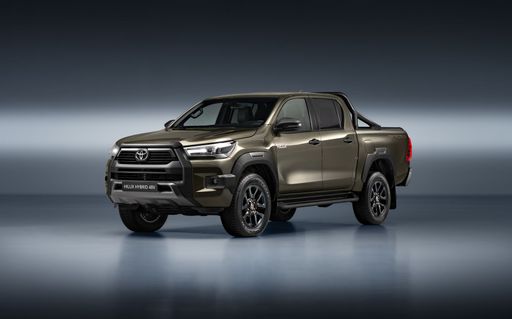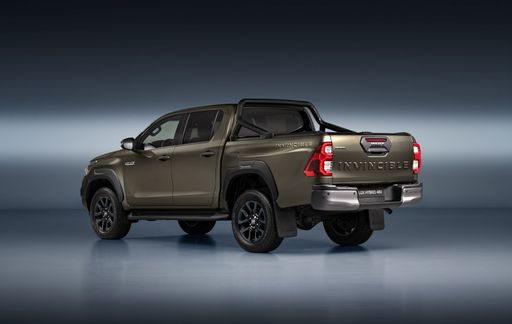Ford Transit Transporter vs Toyota Hilux - Differences and prices compared
Compare performance (269 HP vs 204 HP), boot space and price (39900 £ vs 39800 £ ) at a glance. Find out which car is the better choice for you – Ford Transit Transporter or Toyota Hilux?
Costs and Efficiency:
Price and efficiency are often the first things buyers look at. Here it becomes clear which model has the long-term edge – whether at the pump, the plug, or in purchase price.
Toyota Hilux has a hardly perceptible advantage in terms of price – it starts at 39800 £ , while the Ford Transit Transporter costs 39900 £ . That’s a price difference of around 174 £.
Fuel consumption also shows a difference: Ford Transit Transporter manages with 7.90 L and is therefore evident more efficient than the Toyota Hilux with 9.70 L. The difference is about 1.80 L per 100 km.
Engine and Performance:
Power, torque and acceleration are the classic benchmarks for car enthusiasts – and here, some clear differences start to show.
When it comes to engine power, the Ford Transit Transporter has a evident edge – offering 269 HP compared to 204 HP. That’s roughly 65 HP more horsepower.
In terms of top speed, the Toyota Hilux performs evident better – reaching 175 km/h, while the Ford Transit Transporter tops out at 120 km/h. The difference is around 55 km/h.
There’s also a difference in torque: Toyota Hilux pulls to a small extent stronger with 500 Nm compared to 430 Nm. That’s about 70 Nm difference.
Space and Everyday Use:
Whether family car or daily driver – which one offers more room, flexibility and comfort?
Seats: Ford Transit Transporter offers somewhat more seating capacity – 6 vs 5.
In curb weight, Ford Transit Transporter is minimal lighter – 2074 kg compared to 2085 kg. The difference is around 11 kg.
When it comes to payload, Ford Transit Transporter clearly takes the win – 2607 kg compared to 1125 kg. That’s a difference of about 1482 kg.
Who wins the race in the data check?
The Ford Transit Transporter sits well ahead of its rival in the objective data comparison.
This result only shows which model scores more points on paper – not which of the two cars feels right for you.
Costs and Consumption
View detailed analysis
Engine and Performance
View detailed analysis
Dimensions and Body
View detailed analysis

Ford Transit Transporter
Ford Transit Transporter
The Ford Transit is the no-nonsense workhorse that turns heavy-duty hauling into a surprisingly civilized experience, with a cabin that favors practicality over pretense. It’s the go-to for tradespeople and fleet managers who want reliability, adaptability and low running headaches — not showy gimmicks.
details


Toyota Hilux
The Toyota Hilux is a no-nonsense pick-up that blends worksite toughness with proper off-road ability, built to shrug off punishment and keep going long after fancier rivals give up. It won’t win any beauty contests, but buyers who want a practical, rugged truck that simply gets the job done will appreciate its honest, hard-working character.
details

Costs and Consumption |
|
|---|---|
|
Price
39900 - 73000 £
|
Price
39800 - 56200 £
|
|
Consumption L/100km
7.9 - 10.3 L
|
Consumption L/100km
9.7 - 10 L
|
|
Consumption kWh/100km
21.3 - 32 kWh
|
Consumption kWh/100km
-
|
|
Electric Range
247 - 402 km
|
Electric Range
-
|
|
Battery Capacity
68 kWh
|
Battery Capacity
-
|
|
co2
0 - 270 g/km
|
co2
253 - 264 g/km
|
|
Fuel tank capacity
70 L
|
Fuel tank capacity
80 L
|
Dimensions and Body |
|
|---|---|
|
Body Type
Cargo Van
|
Body Type
Pickup
|
|
Seats
3 - 6
|
Seats
4 - 5
|
|
Doors
4
|
Doors
2 - 4
|
|
Curb weight
2074 - 2765 kg
|
Curb weight
2085 - 2295 kg
|
|
Trunk capacity
-
|
Trunk capacity
-
|
|
Length
5531 - 6704 mm
|
Length
5325 mm
|
|
Width
2059 mm
|
Width
1855 mm
|
|
Height
2530 - 2778 mm
|
Height
1810 - 1815 mm
|
|
Max trunk capacity
9300 - 14100 L
|
Max trunk capacity
-
|
|
Payload
735 - 2607 kg
|
Payload
915 - 1125 kg
|
Engine and Performance |
|
|---|---|
|
Engine Type
Diesel, Electric
|
Engine Type
Diesel MHEV, Diesel
|
|
Transmission
Manuel, Automatic
|
Transmission
Automatic, Manuel
|
|
Transmission Detail
Manual Gearbox, Automatic Gearbox, Reduction Gearbox
|
Transmission Detail
Automatic Gearbox, Manual Gearbox
|
|
Drive Type
Front-Wheel Drive, Rear-Wheel Drive, All-Wheel Drive
|
Drive Type
All-Wheel Drive
|
|
Power HP
105 - 269 HP
|
Power HP
150 - 204 HP
|
|
Acceleration 0-100km/h
-
|
Acceleration 0-100km/h
-
|
|
Max Speed
120 km/h
|
Max Speed
170 - 175 km/h
|
|
Torque
310 - 430 Nm
|
Torque
400 - 500 Nm
|
|
Number of Cylinders
4
|
Number of Cylinders
4
|
|
Power kW
77 - 198 kW
|
Power kW
110 - 150 kW
|
|
Engine capacity
1996 cm3
|
Engine capacity
2393 - 2755 cm3
|
General |
|
|---|---|
|
Model Year
2019 - 2024
|
Model Year
2024 - 2025
|
|
CO2 Efficiency Class
G, A
|
CO2 Efficiency Class
G
|
|
Brand
Ford
|
Brand
Toyota
|
What drivetrain options does the Ford Transit Transporter have?
Available configurations include Front-Wheel Drive, Rear-Wheel Drive or All-Wheel Drive.
